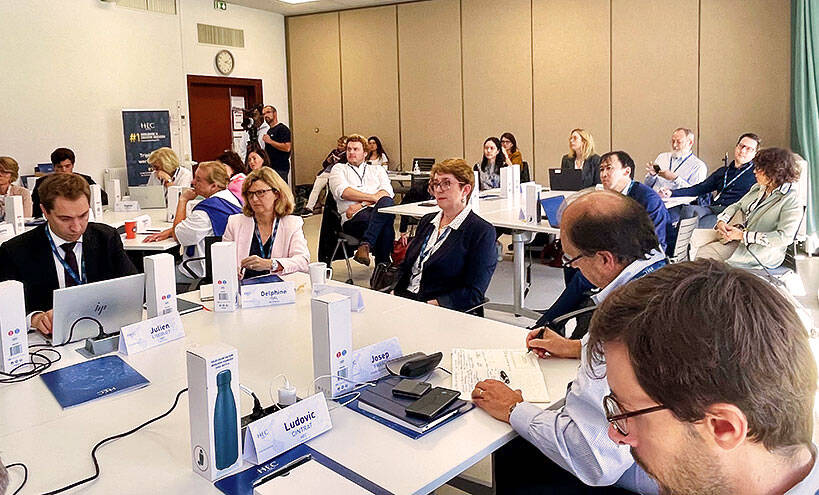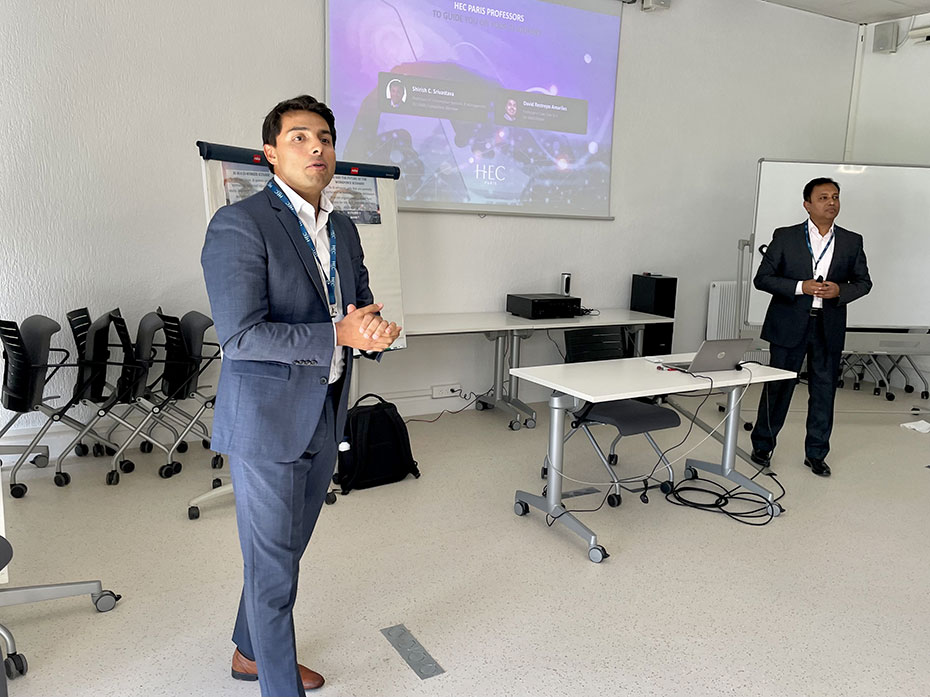AI and Talent Development. Should We Fear or Embrace It?
Back in 2020, Open.AI's GPT3 burst onto the scene, captivating the world with its artificial intelligence capabilities. Fast forward to today, and AI models have become an integral part of our daily lives. But as automation continues to revolutionize industries, the fear of AI taking over has also grown, fueling concerns about superintelligent machines running amok.
Amidst this mix of awe, apprehension, and attempts to rein in AI's potential downsides, one thing is certain: technology has already transformed how we work, and there's much more to come. So, the burning question remains: "Will AI replace us or will it give us superpowers"? To delve into this quandary, HEC Paris Executive Education and EFMD recently organized a half-day workshop, specifically designed for learning and development (L&D) professionals.

Learning and Development teams are faced with the imperative to reconsider their profession as AI revolutionizes the fundamental nature of work. This AI-driven automation is reshaping workforces, compelling businesses to transform their strategies. With labor markets remaining tight, upskilling and reskilling programs are set to shuffle the pack of talent management.
But here's the million-dollar question: once a company has equipped itself with AI-ready skills, how can it fully leverage this newfound advantage? And what about the flip side? If artificial intelligence becomes readily available to all, how do we ensure that technology's darker aspects don't overshadow its potential benefits? From privacy breaches and intellectual property theft to discrimination, accidents, wars, and even political ramifications, the list of concerns seems never-ending. It's a tangled web of questions, and often, there's no one-size-fits-all answer. To address these challenges, a collaborative effort involving HR, L&D specialists, and academic research is crucial.
"Will AI replace us or give us superpowers?"
HEC Executive Education and EFMD collaborated to host an insightful workshop at HEC Le Chateau, on September 25. Seasoned decision-makers in executive development, learning, and talent management came together to tackle a fundamental question: "Will AI replace us or give us superpowers?".
The workshop was facilitated by David Restrepo Amariles, Associate Professor of Data Law and Artificial Intelligence, and Shirish C. Srivastava, Professor in Information Systems and Operations Management, both experts from Hi! Paris, HEC's dedicated center on Data Science and AI. Their expertise contributed to fostering collective understanding during the seminar.
Anne-Valérie Corboz, Professor of Strategy and Dean at HEC Paris Executive Education, and Martin Moehrle, Director of Corporate Service and the Corporate Learning Improvement Process (CLIP) at EFMD opened the discussions with a thought-provoking look at the future of the organizations:
"Workforce, business, society. These are three dimensions that AI is going to disrupt. So let us here, this afternoon, work together to explore the many hats of learning and talent development during these challenging times", Martin Moehrle stated in his introduction.
"Focusing too much on the "fish" - such as AI or any other pressing topic - we tend to overlook the waters, which represent the context and the bigger picture. Today, I believe that learning and development professionals should shift their focus from solely preparing people for specific skills to preparing employees for uncertainty", Anne-Valérie Corboz emphasized, using the fish comparison to convey the importance of considering the broader context.
So, when did AI get its start?
"Well, artificial intelligence is not something new. The first relevant paper on artificial intelligence emerged in 1950, authored by Alan Turing.
And everyone knows Alain Turing, right?", Professor Shirish Srivastava called out, seeking confirmation. The room nodded in recognition, aware of Turing's signification. The puzzle deepened as the conversation turned to the Turing test: "So what's the Turing test about?" A participant quickly answered, "casual conversation about what humans normally talk about". Another participant chimed in, "And being able to identify artificial contribution into the conversation". "Exactly!" Professor Srivastava exclaimed, summarizing their responses.
"The first definition of AI, as offered by the Turing Test is about its indistinguishability from human beings. From the very beginning, we aimed for real intelligence, incorporating the competencies and capabilities of real human beings into machines. This is where the quest for AI started."
A new stream of research explores humans' tendency to anthropomorphize AI. "Can you interact with a guy - and when I say a 'guy', I mean a machine, which is like you?" Professor Srivastava posed, eliciting laughter from the audience. The audience laughs, and Shirish continues. "That's the key question. We conducted a research paper a few years back, examining the core competencies needed in AI-powered chatbots to ensure people adopt them".
But the story had more to offer. "So, where does the role of machine learning come into this broad picture of artificial intelligence?", Professor Srivastava continued, preparing for a mini math lesson. "Suppose we reverse the problem. We are not trying to perform operations using the predefined X or Y values. We are on a quest for the unknown. Can we discover X and Z using the power of computation?" Silence filled the room as curious minds pondered the question. "This is where we can see how the field of learning and development can leverage the benefits of machine learning", Professor Srivastava concluded, emphasizing the potential of data-driven approaches.
How can AI help identify the ideal set of skills for organizations?
In the spotlight now is Professor David Restrepo Amariles, ready to delve into the topic of finding the perfect candidate for a specific organization. "So, let's think about what makes the perfect candidate for some of you", Professor Amariles began, engaging the audience.
The HR manager in the back swiftly called out, "Work experience!", while a talent manager added, "Languages!" Another voice chimed in, "International experience!"
"We've just identified several variables that contribute to finding the perfect candidate", Professor Amariles acknowledged. "Experience, training, international exposure, and so on. Now let's consider the algorithm. We can assign weights to each variable. For instance, we can give three points to the "international experience" criterion. By weighing each criterion, we can evaluate candidates' CVs and determine if they meet all these criteria. This allows us to identify the right skills."
Another perspective on using data to train AI models is to assume that we lack the necessary data regarding potential hires. "In this case, we can train a model. We can ask, 'Analyze the data of the highly successful people I've hired, identify the factors contributing to their success, and guide me on which criteria to prioritize'", Professor Amariles explained.
Both approaches involve employing training data to teach machine learning algorithms how to make informed decisions. However, it's crucial to acknowledge potential limitations and address any questions that may arise.
"You have to think of skills management as a journey, and not as a fixed destination, especially considering how rapidly technologies evolve. There isn't a definitive moment where we can say, 'These are the exact set of skills we need", Professor Amariles emphasized.
The key challenge lies in dealing with untrained professionals in AI, and untrained AI systems, as biases such as confirmation bias, complexity bias, and ethical bias may enter the equation."To combat this, it is crucial to align your AI systems with corporate values and rules. Ethical governance must be an integral part of the process", Professor Restrepo Amariles concluded, summarizing the importance of ethical considerations in AI implementation.
How AI matching can help attract and train the best talent?
At the conclusion of the workshop, each group eagerly presented their brainstorming results on four specific corporate use cases, revealing an eye-opener lesson on the immense possibilities AI offers for talent matching.
David Jestaz, VP at Faurecia Unversity and HR Transformation, shared how the French tech company leverages artificial intelligence to match talent for executive positions. For the past year, they have utilized the Eightfold Talent Intelligence Platform to identify more candidates from its existing Applicant Tracking System. "The process is all about matching; there is no intelligence involved", Jestaz explained. "We use the term 'calibration' to describe the ongoing correlation between the job requirements and the analyzed resumes".
Reflecting on the use of AI in talent management, Jestaz candidly stated, "We've learned that AI works best when there are strong incentives for people to provide information. However, when it comes to talent management internally, the results have been less impressive".
For Marco Mullers, VP, Head of Performance, Skills & Development at DSM, the true genius of AI appears when humans are able to combine multiple methods or engines - such as OpenAI - and deliver personalized learning experiences. "We are teaching our HR professionals how to use prompts to offer personalized advice to our employees", Mullers shared. "Today, we can guide our employees on how to prompt their ML models to build their own career and custom learning paths. We have developed complex prompts that can be configured to assist them".
AI and change management go hand in hand and should be seen as an ongoing iterating testing process, as explained by Carlos Montalvan, the Corporate Senior Vice President of Talent & Learning at Intercorp. Montalvan emphasized the power of internal gamification in boosting collective intelligence on AI and helping employees develop practical skills. "Instead of dictating that we must use these technologies, we suggested that our employees join an AI intelligence taskforce. In this setting, they would have the opportunity to explore and experiment with new tools. Afterward, they would share their discoveries with the company and explain which AI tool best suits specific needs".
Taking the floor next, Nadege Riehl, VP of Talent Management & Learning at Schneider Electric France, showcased the group's OTM (Open Talent Management) platform and highlighted the use of AI in internal upskilling, mentoring, and networking. "To truly harness the power of AI, we must begin by providing comprehensive training. While full-scale implementation may not be feasible immediately, targeting specific populations can pave the way."
As Alan Turing famously put it in 1950, referring to the process of machine teaching and learning in the "imitation game", "We can only see a short distance ahead, but we can see plenty there that needs to be done."
If you find yourself seeking clarity amid uncertainties surrounding AI and talent management, the eye-opening lessons from this workshop are just the tip of the iceberg. HEC Executive Education is here to assist you in diving deeper into the potential of AI and its impact on talent development. Our Custom Programs are designed to provide tailored experiences that align with your organization's unique needs, whether it's in AI and data expertise, leadership, strategy, or any other organizational challenges.
